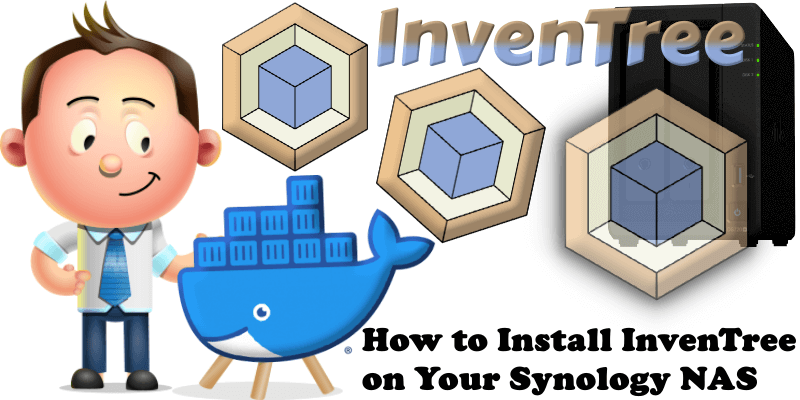
InvenTree is an open-source inventory management system which provides intuitive parts management and stock control. It is designed to be lightweight and easy to use for SME or hobbyist applications. Powerful business logic works in the background to ensure that stock tracking history is maintained, and users have ready access to stock level information. InvenTree is designed to allow for a flexible installation. In this step by step guide I will show you how to install InvenTree on your Synology NAS using Docker & Portainer.
This guide works perfectly with the latest InvenTree v1.2.2 release.
STEP 1
Please Support My work by Making a Donation.
STEP 2
Install Portainer using my step by step guide. If you already have Portainer installed on your Synology NAS, skip this STEP. Attention: Make sure you have installed the latest Portainer version.
STEP 3
Make sure you have a synology.me Wildcard Certificate. Follow my guide to get a Wildcard Certificate. If you already have a synology.me Wildcard certificate, skip this STEP.
STEP 4
Go to Control Panel / Login Portal / Advanced Tab / click Reverse Proxy. Follow the instructions in the image below.
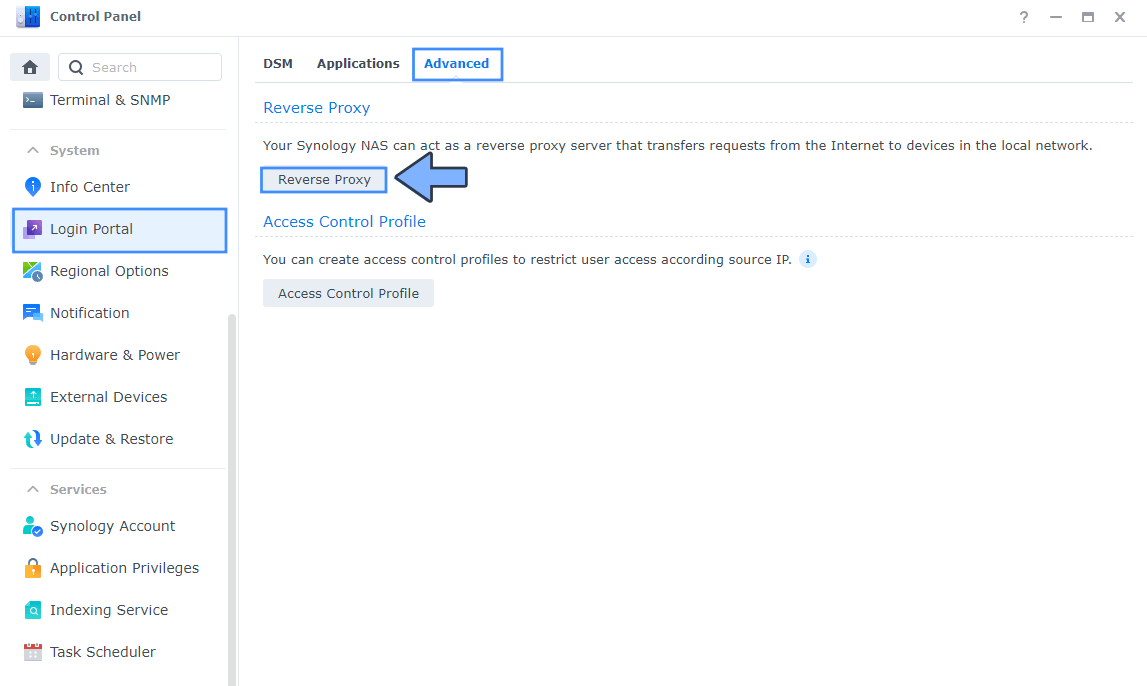
STEP 5
Now click the “Create” button. Follow the instructions in the image below.
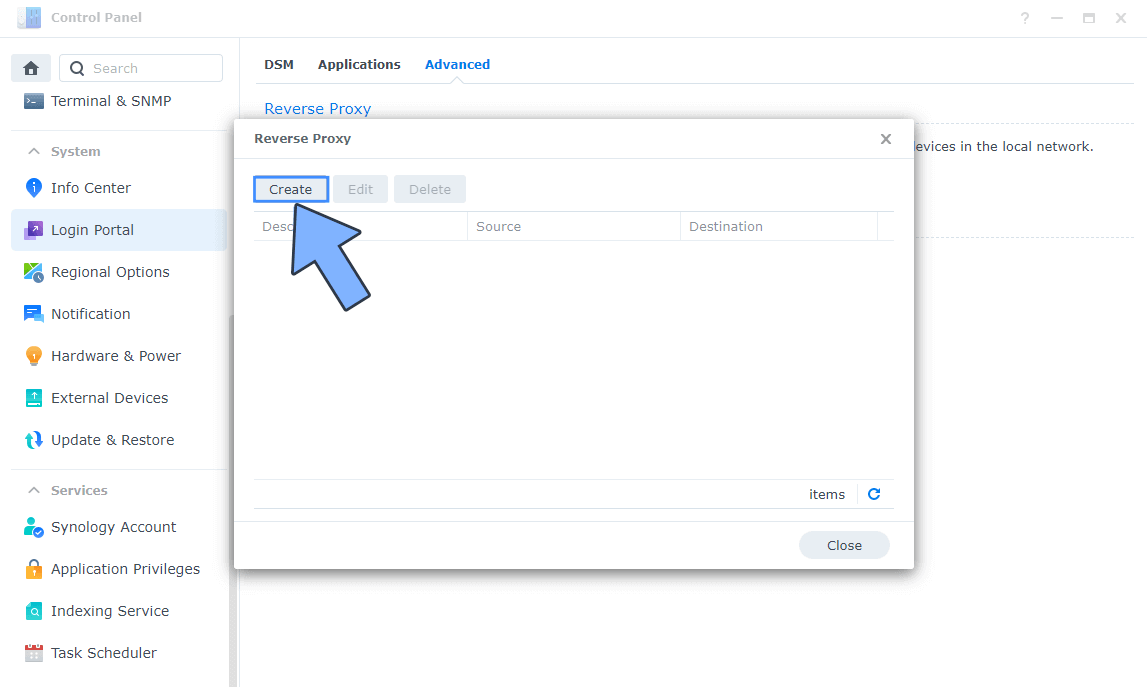
STEP 6
After you click the Create button, the window below will open. Follow the instructions in the image below.
On the General area, set the Reverse Proxy Name description: type in InvenTree. After that, add the following instructions:
Source:
Protocol: HTTPS
Hostname: inventree.yourname.synology.me
Port: 443
Check Enable HSTS
Destination:
Protocol: HTTP
Hostname: localhost
Port: 5234
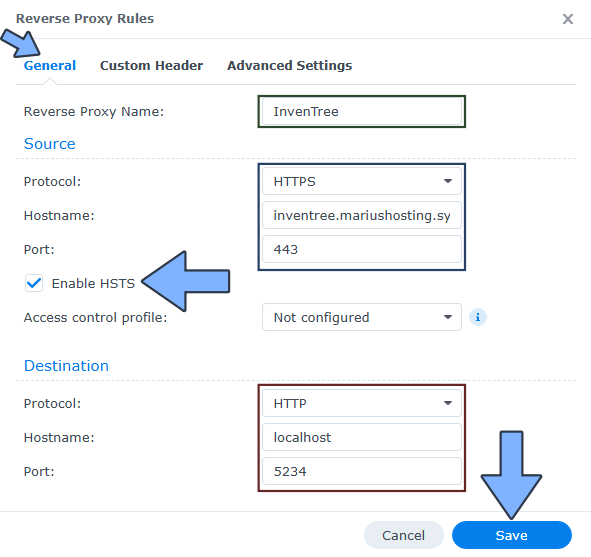
STEP 7
On the Reverse Proxy Rules, click the Custom Header tab. Click Create and then, from the drop-down menu, click WebSocket. After you click on WebSocket, two Header Names and two Values will be automatically added. Click Save. Follow the instructions in the image below.

STEP 8
On the Reverse Proxy Rules, click the Custom Header tab. Click Create and then, from the drop-down menu, click Create. One by one, add the following parameters:
Header Name Value
Access-Control-Allow-Origin *
Access-Control-Allow-Methods GET,HEAD,OPTIONS
Access-Control-Allow-Headers Authorization,Content-Type,User-Agent
Click Save. Follow the instructions in the image below.
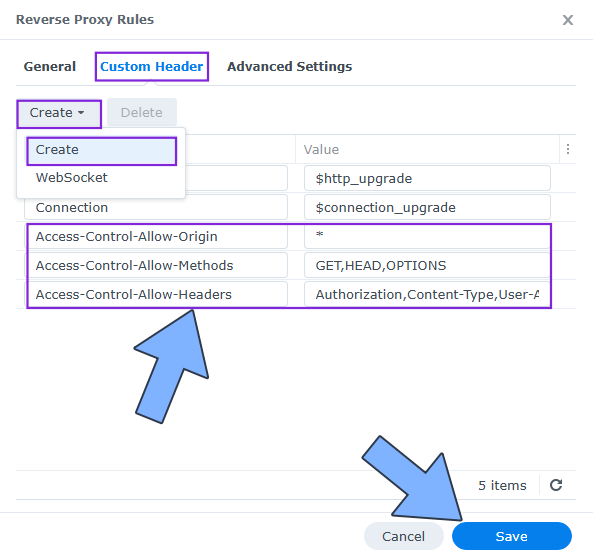
STEP 9
Go to Control Panel / Network / Connectivity tab/ Check Enable HTTP/2 then click Apply. Follow the instructions in the image below.
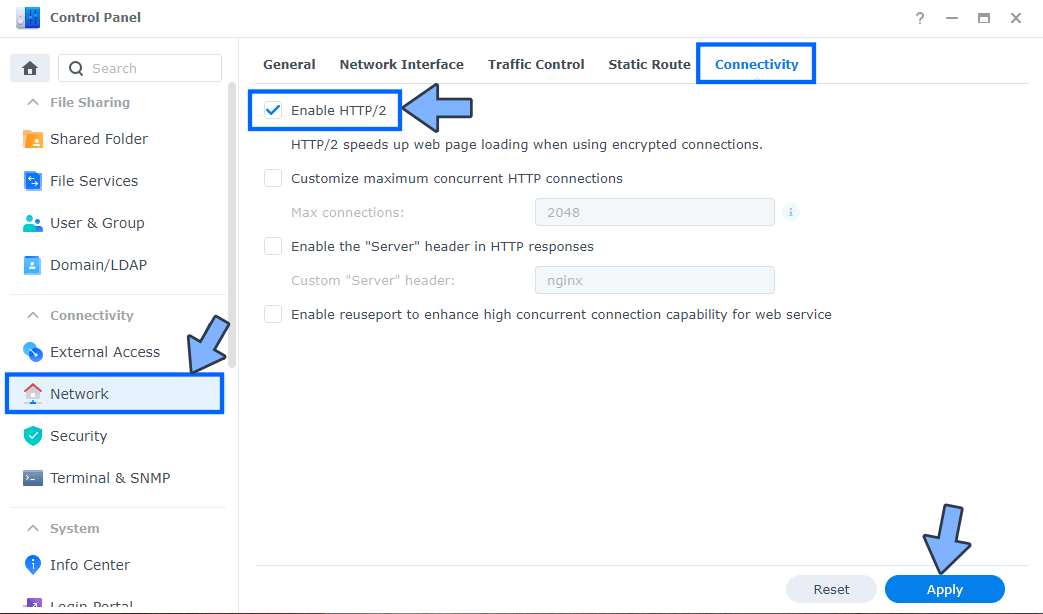
STEP 10
Go to Control Panel / Security / Advanced tab/ Check Enable HTTP Compression then click Apply. Follow the instructions in the image below.
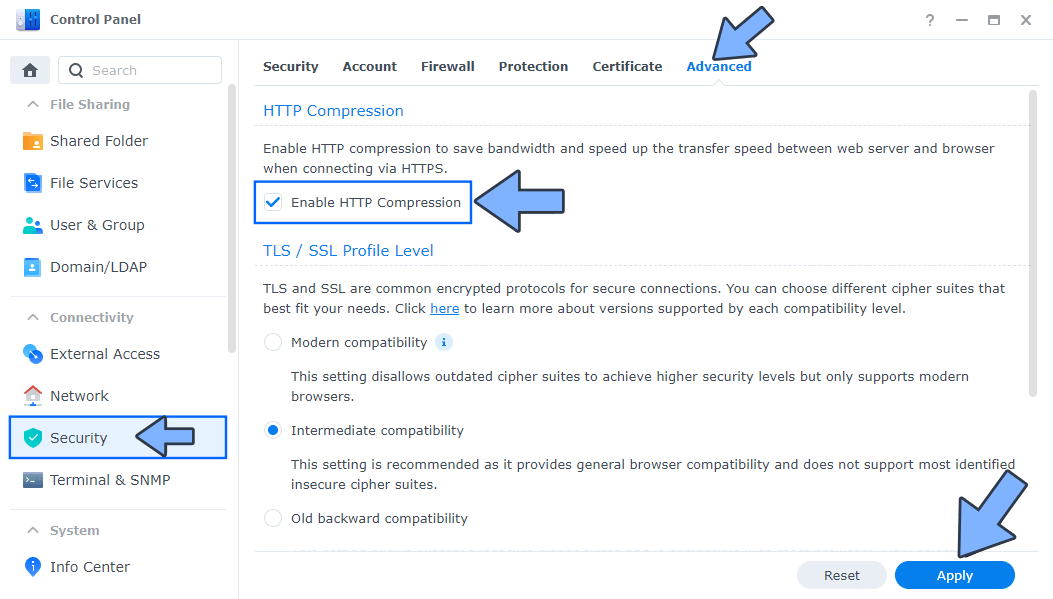
STEP 11
Go to File Station and open the docker folder. Inside the docker folder, create one new folder and name it inventree. Follow the instructions in the image below.
Note: Be careful to enter only lowercase, not uppercase letters.
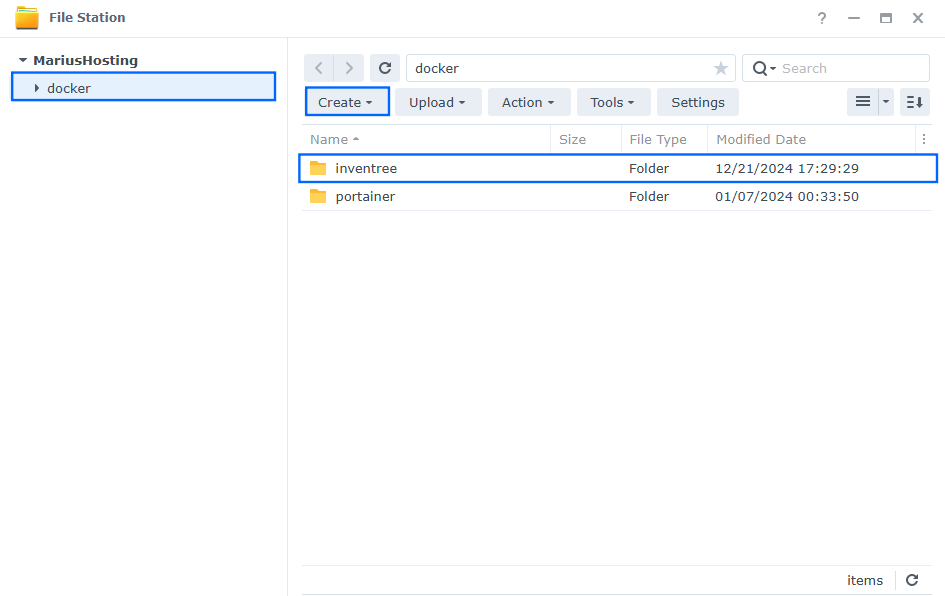
STEP 12
Now create three new folders inside the inventree folder that you have previously created at STEP 11 and name them data, db, redis. Follow the instructions in the image below.
Note: Be careful to enter only lowercase, not uppercase letters.
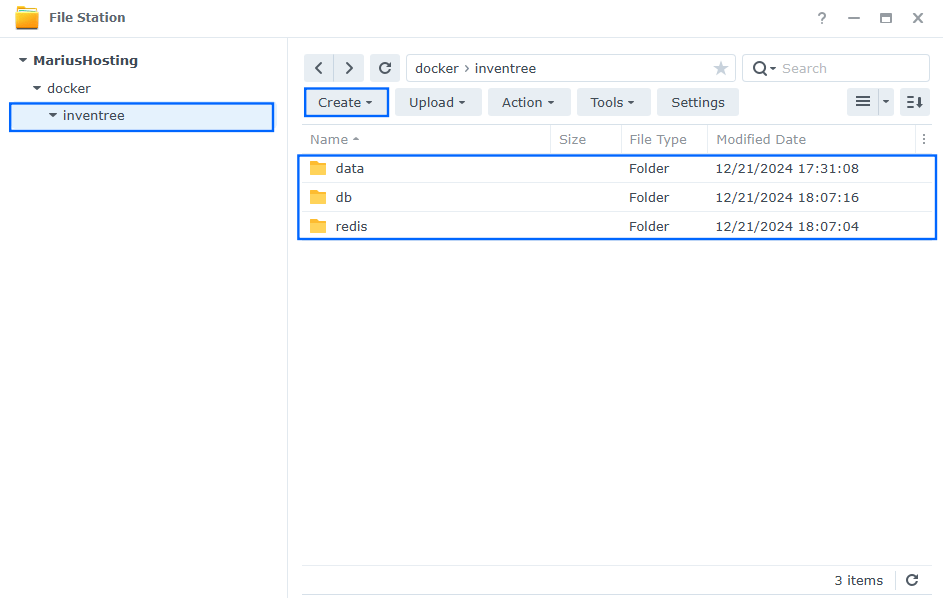
STEP 13
Follow my step by step guide on how to activate SMTP for your Gmail account. This step is mandatory. Note: If you don’t want to use the easiest way for SMTP with Google and you already have SMTP details from your own Mail Server, you can just skip this STEP and use your personalized email SMTP details instead.
STEP 14
Log into Portainer using your username and password. On the left sidebar in Portainer, click on Home then Live connect. Follow the instructions in the image below.

On the left sidebar in Portainer, click on Stacks then + Add stack. Follow the instructions in the image below.

STEP 15
In the Name field type in inventree. Follow the instructions in the image below.
services:
inventree-db:
image: postgres:17
container_name: InvenTree-DB
hostname: inventree-db
security_opt:
- no-new-privileges:true
healthcheck:
test: ["CMD", "pg_isready", "-q", "-d", "inventree", "-U", "inventreeuser"]
timeout: 45s
interval: 10s
retries: 10
volumes:
- /volume1/docker/inventree/db:/var/lib/postgresql/data:rw
environment:
POSTGRES_DB: inventree
POSTGRES_USER: inventreeuser
POSTGRES_PASSWORD: inventreepass
restart: on-failure:5
inventree-cache:
image: redis:7
container_name: InvenTree-REDIS
healthcheck:
test: ["CMD-SHELL", "redis-cli ping || exit 1"]
volumes:
- /volume1/docker/inventree/redis:/data:rw
depends_on:
inventree-db:
condition: service_healthy
env_file:
- stack.env
restart: on-failure:5
inventree-server:
image: inventree/inventree:latest
container_name: InvenTree-SERVER
healthcheck:
test: timeout 10s bash -c ':> /dev/tcp/127.0.0.1/8000' || exit 1
interval: 10s
timeout: 5s
retries: 3
start_period: 90s
ports:
- 5234:8000
depends_on:
inventree-db:
condition: service_healthy
env_file:
- stack.env
volumes:
- /volume1/docker/inventree/data:/home/inventree/data:rw
restart: on-failure:5
inventree-worker:
image: inventree/inventree:latest
container_name: InvenTree-WORKER
command: invoke update
depends_on:
inventree-db:
condition: service_healthy
env_file:
- stack.env
volumes:
- /volume1/docker/inventree/data:/home/inventree/data:rw
restart: on-failure:1
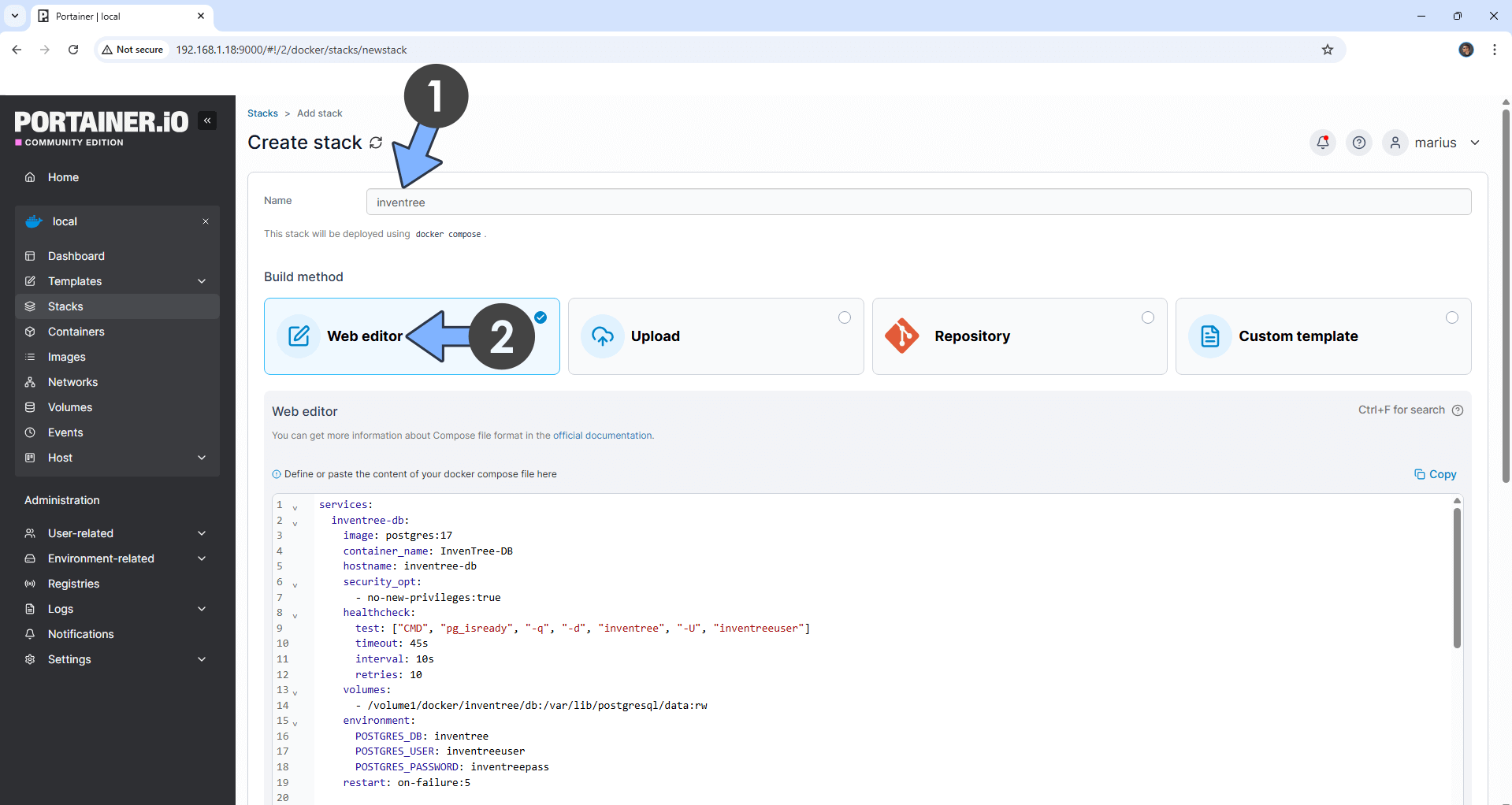
STEP 16
Click the Upload button after Web editor. Download the stack.env file by clicking the blue link below and then upload it from your computer in the “Load variables from .env files“. Follow the instructions in the image below. 🔒Note: Support my work to unlock the password. You can use this password to download any file on mariushosting forever!
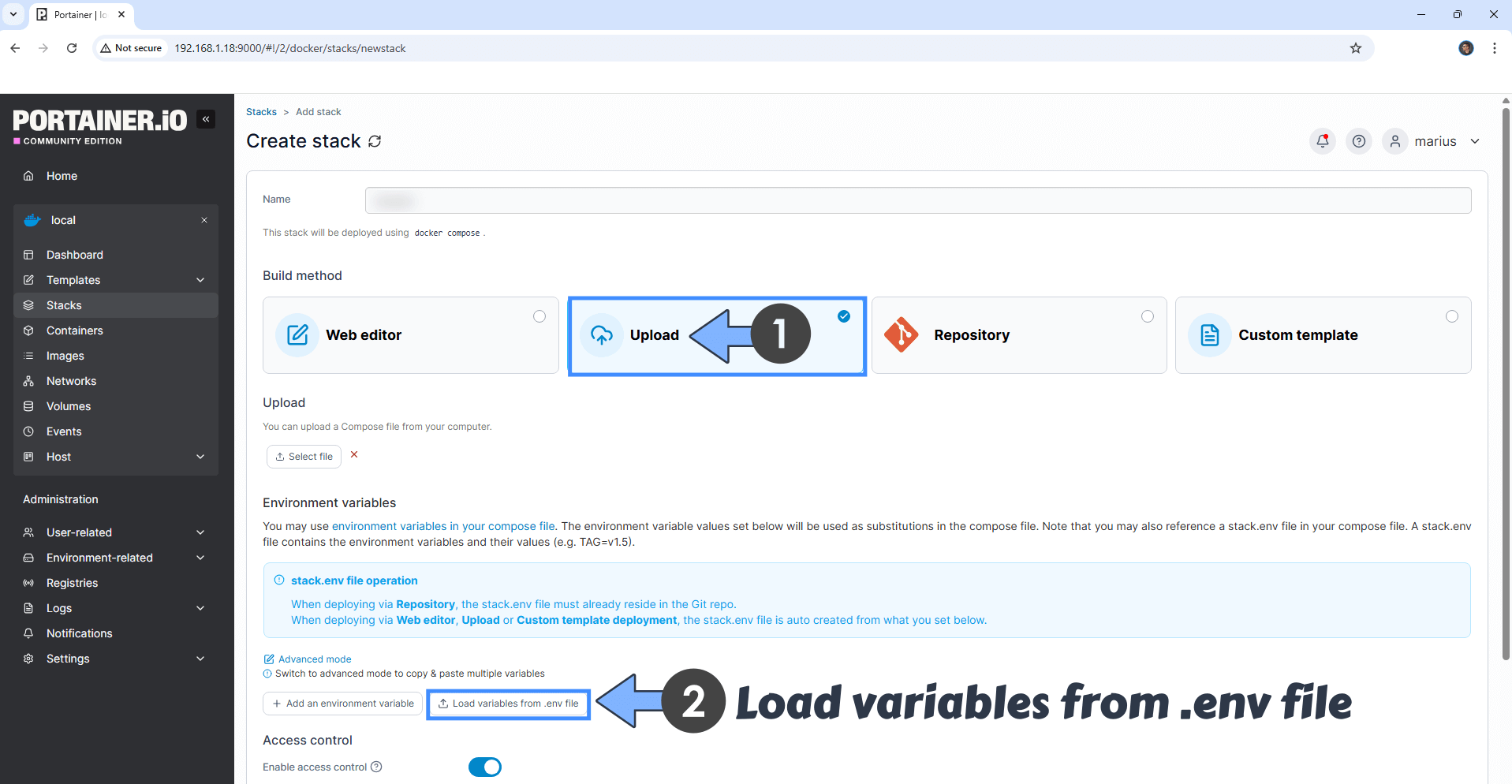
STEP 17
Note: On the Environment variables area, change the value for INVENTREE_ADMIN_USER and add your own Username.
Note: On the Environment variables area, change the value for INVENTREE_ADMIN_PASSWORD and add your own Password.
Note: On the Environment variables area, change the value for INVENTREE_ADMIN_EMAIL and add your own email address.
Note: On the Environment variables area, change the value for INVENTREE_SITE_URL. Type in your own synology.me DDNS that you have previously created at STEP 6 with https at the beginning.
Note: On the Environment variables area, change the value for INVENTREE_TRUSTED_ORIGINS. Type in your own synology.me DDNS that you have previously created at STEP 6 with https at the beginning.
Note: On the Environment variables area, change the value for INVENTREE_CORS_ORIGIN_WHITELIST. Type in your own synology.me DDNS that you have previously created at STEP 6 with https at the beginning.
Note: On the Environment variables area, change the value for INVENTREE_TIMEZONE and add your own TIMEZONE. (Select your current Time Zone from this list.)
Note: On the Environment variables area, change the value for INVENTREE_EMAIL_USERNAME and type in your own Gmail address. STEP 13.
Note: On the Environment variables area, change the value for INVENTREE_EMAIL_SENDER and type in your own Gmail address. STEP 13.
Note: On the Environment variables area, change the value for INVENTREE_EMAIL_PASSWORD and type in your own Gmail app password. STEP 13.
⚠️Warning: Do not change any of the other values.
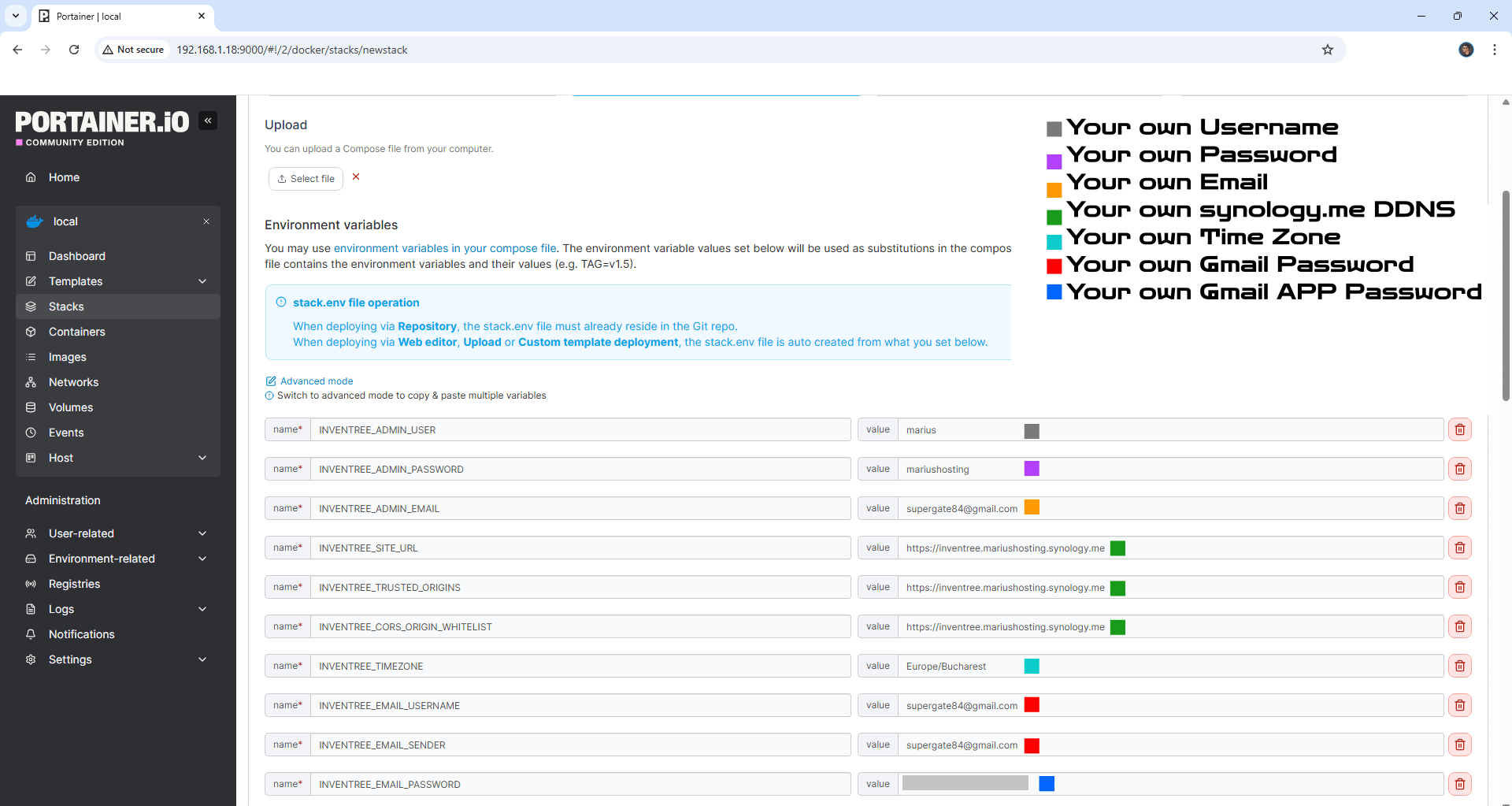
STEP 18
After you make the changes, click the Web editor button. Follow the instructions in the image below.
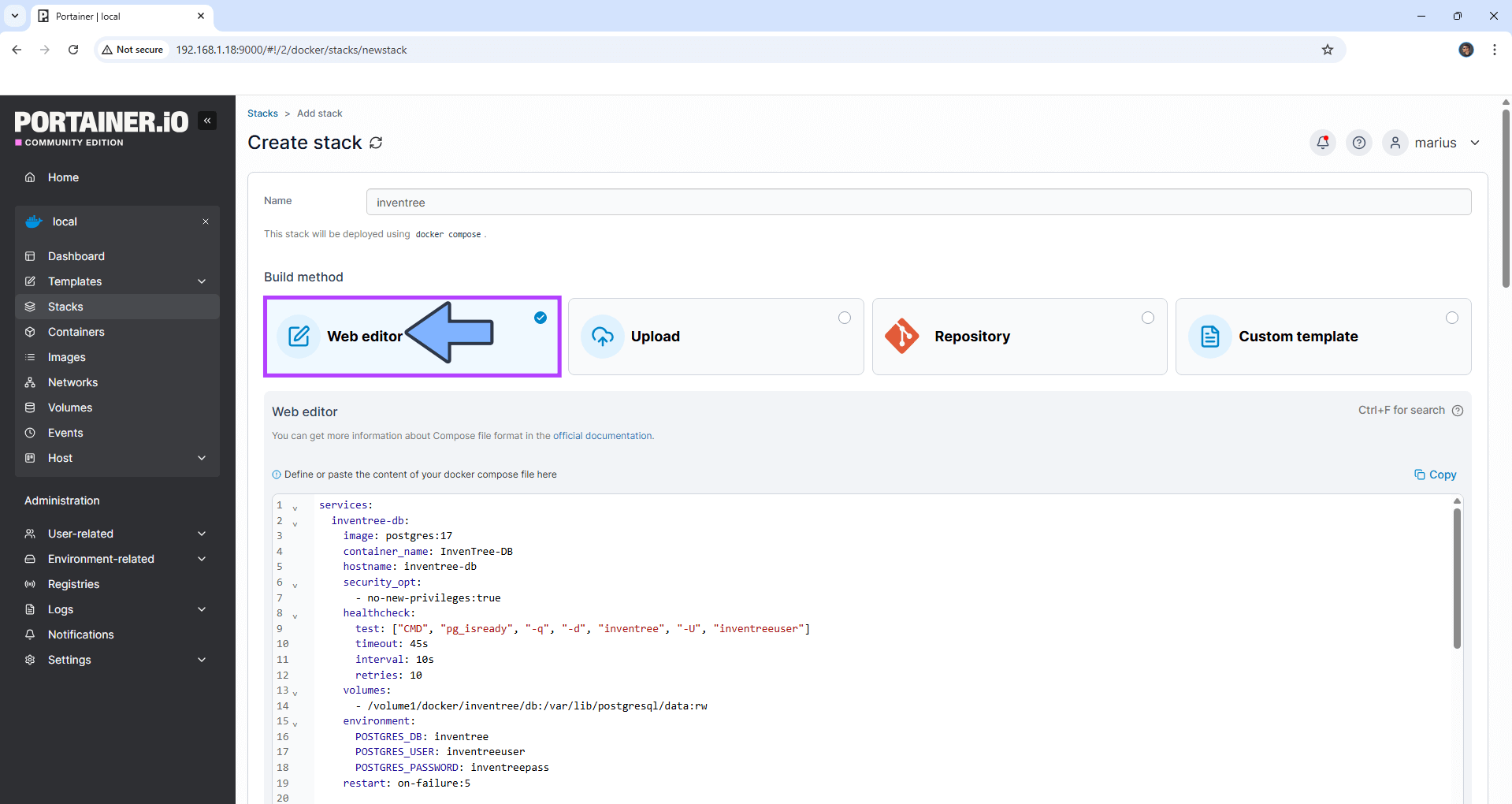
STEP 19
Scroll down on the page until you see a button named Deploy the stack. Click on it. Follow the instructions in the image below. The installation process can take up to a few minutes. It will depend on your Internet speed connection.
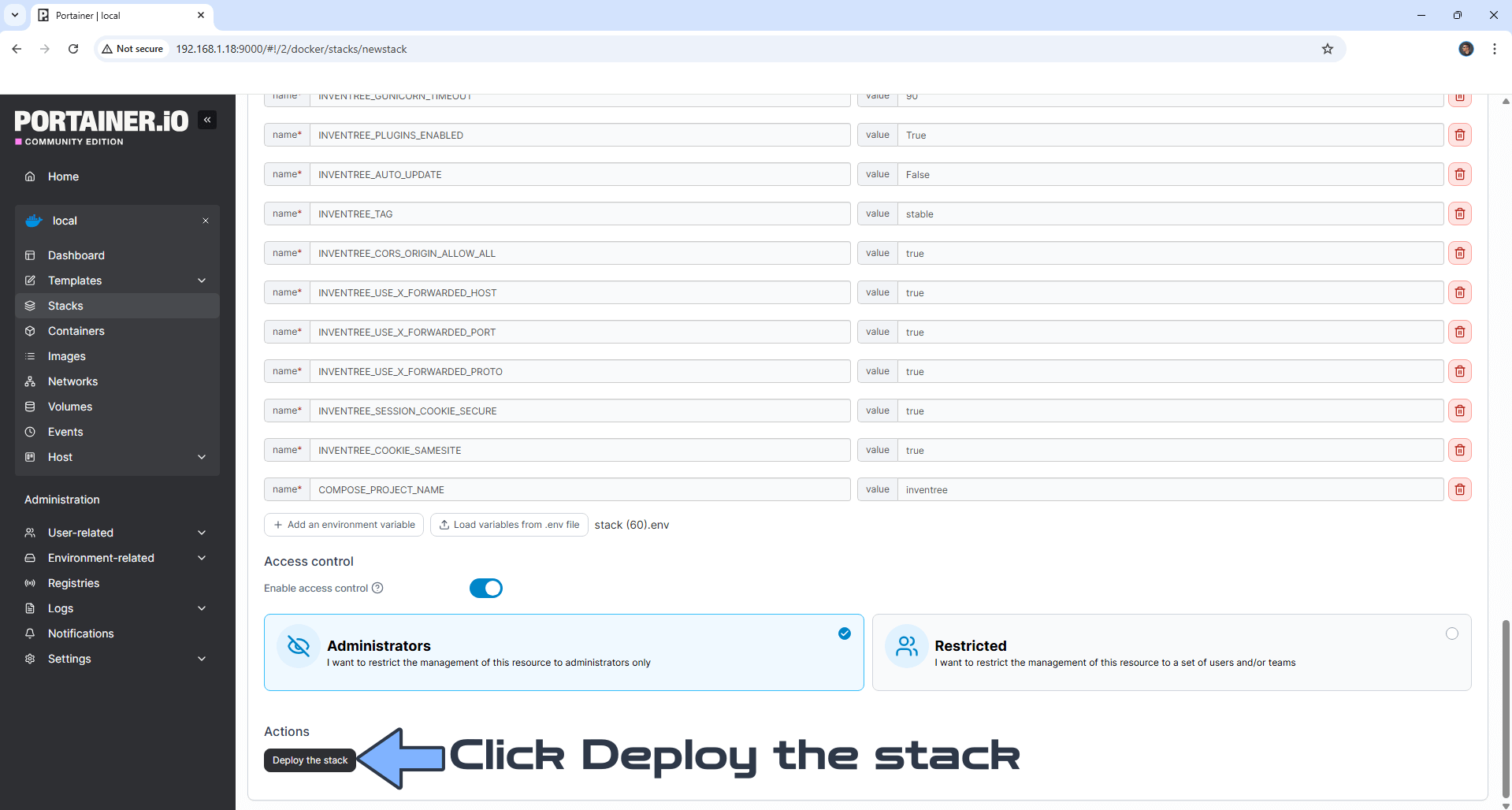
STEP 20
If everything goes right, you will see the following message at the top right of your screen: “Success Stack successfully deployed“.

STEP 21
⚠️Wait approximately 10 minutes until Inventree-WORKER is marked as exited. Refresh the page from time to time to check the status.
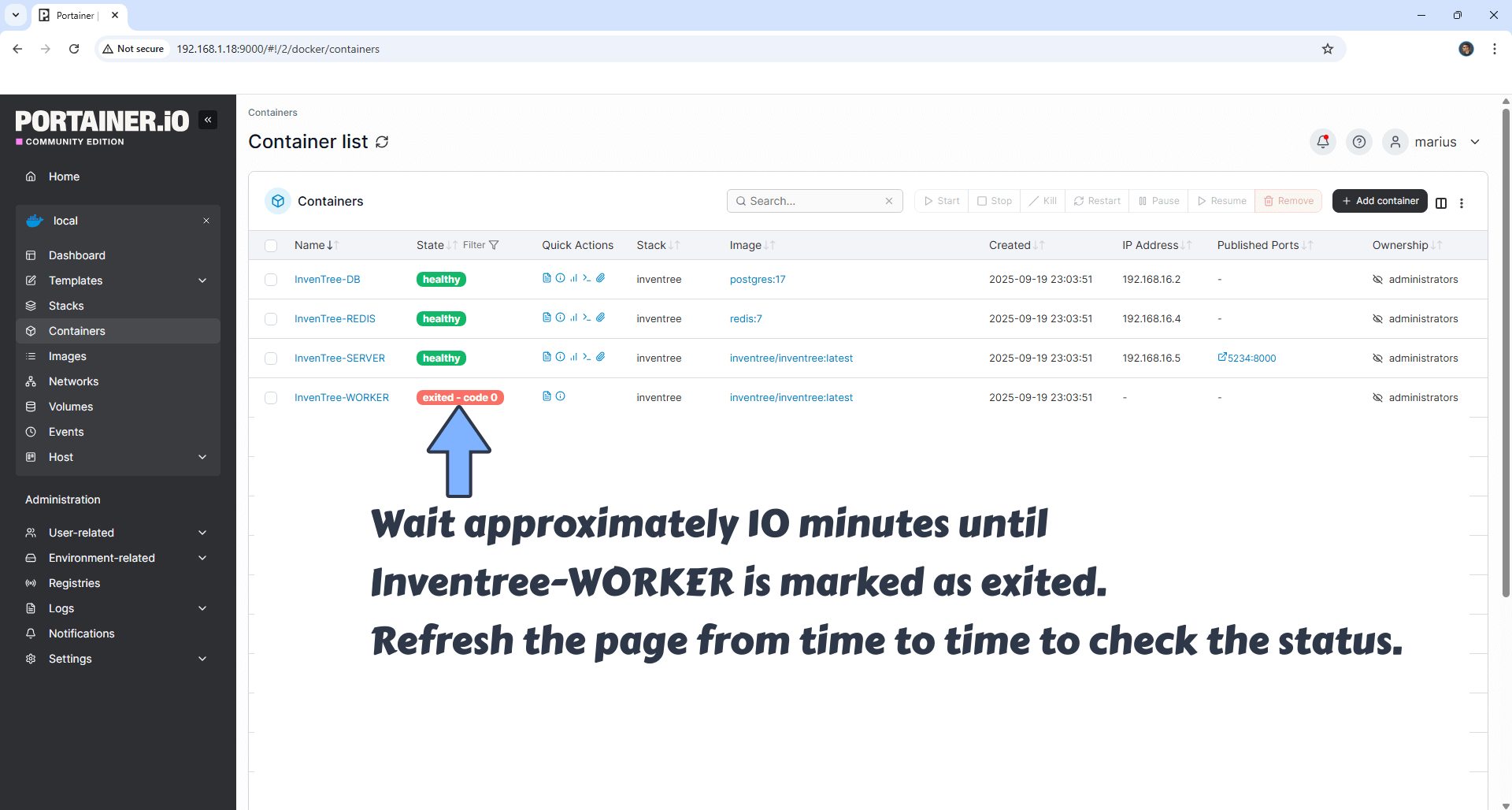
STEP 22
Once both containers are marked as exited, go to Stacks then click inventree. Follow the instructions in the image below.
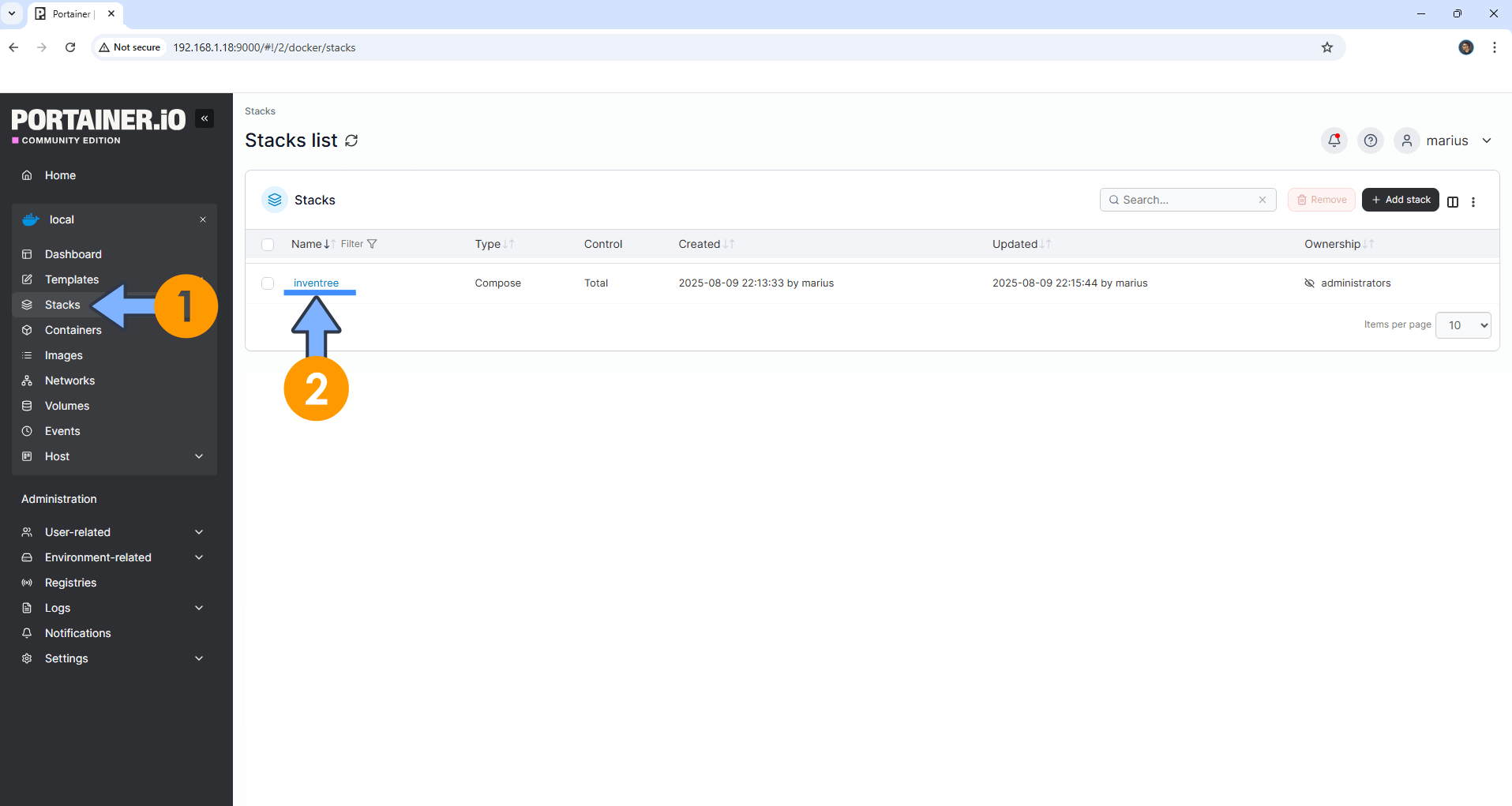
STEP 23
Once you click inventree at STEP 22, click the Editor tab. On the inventree-worker command area, type in invoke worker instead of invoke update. Click Update the stack. Follow the instructions in the image below.
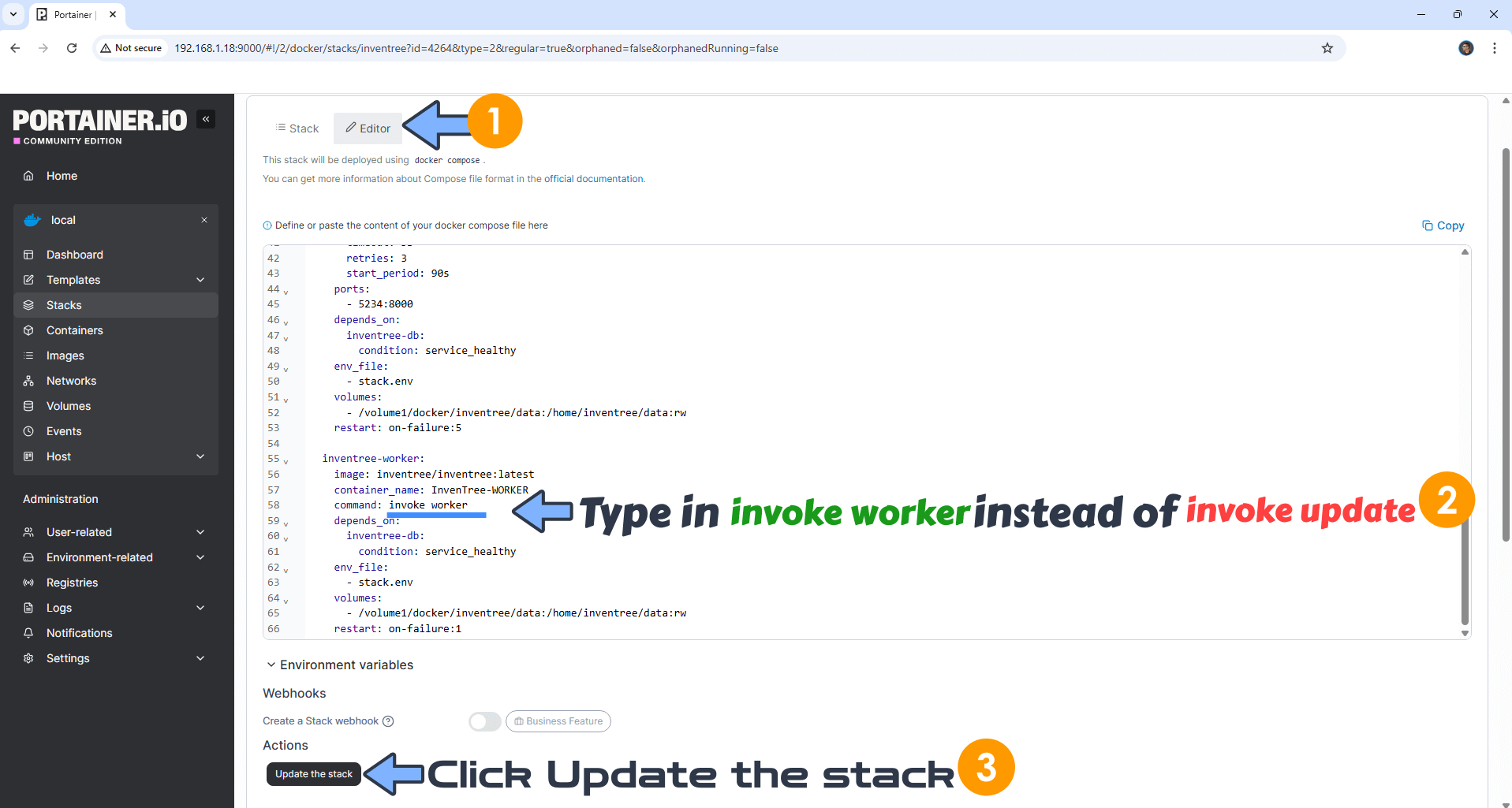
STEP 24
A new pop up window can appear. Click Update. If the pop up window doesn’t appear, go straight to the next STEP. Follow the instructions in the image below.
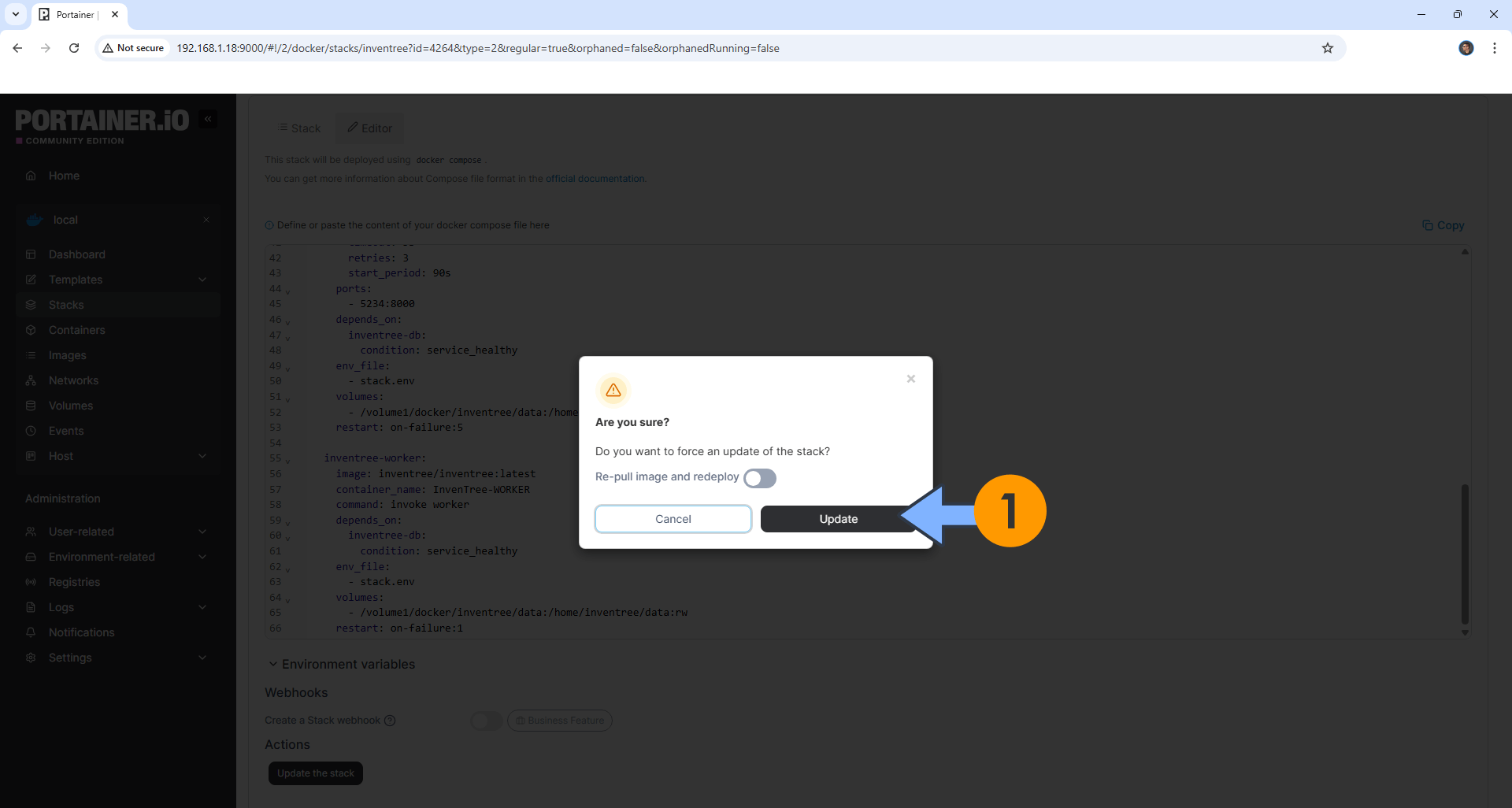
STEP 25
🟢Please Support My work by Making a Donation. Almost 99,9% of the people that install something using my guides forget to support my work, or just ignore STEP 1. I’ve been very honest about this aspect of my work since the beginning: I don’t run any ADS, I don’t require subscriptions, paid or otherwise, I don’t collect IPs, emails, and I don’t have any referral links from Amazon or other merchants. I also don’t have any POP-UPs or COOKIES. I have repeatedly been told over the years how much I have contributed to the community. It’s something I love doing and have been honest about my passion since the beginning. But I also Need The Community to Support me Back to be able to continue doing this work.
STEP 26
Now open your browser and type in your HTTPS/SSL certificate like this https://inventree.yourname.synology.me In my case it’s https://inventree.mariushosting.synology.me If everything goes right, you will see the Inventree Login page. Type in your own Username (INVENTREE_ADMIN_USER) and your own Password (INVENTREE_ADMIN_PASSWORD) that you have previously added at STEP 17, then click Sign In. Follow the instructions in the image below.
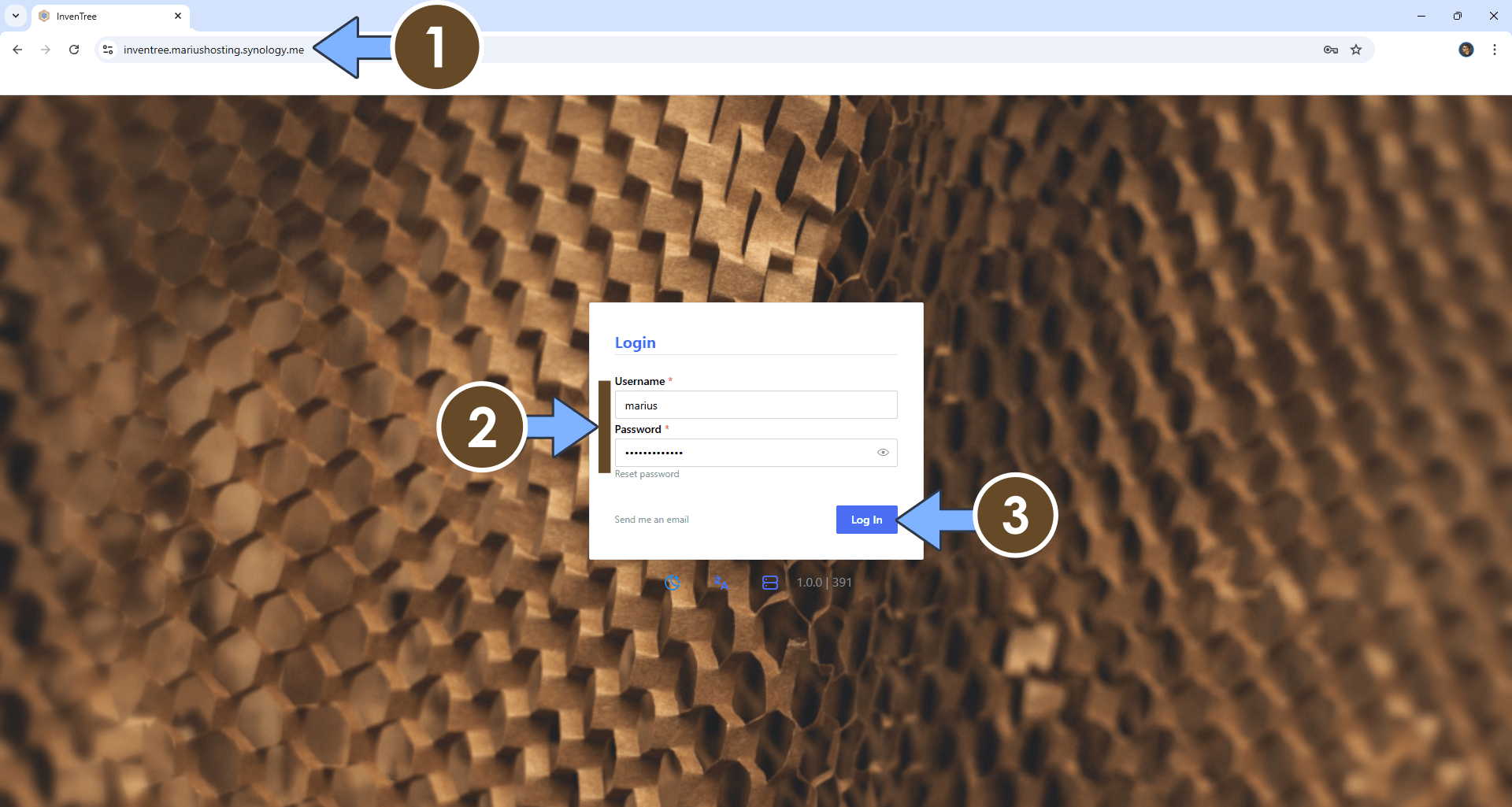
STEP 27
Your Inventree dashboard will look like this.
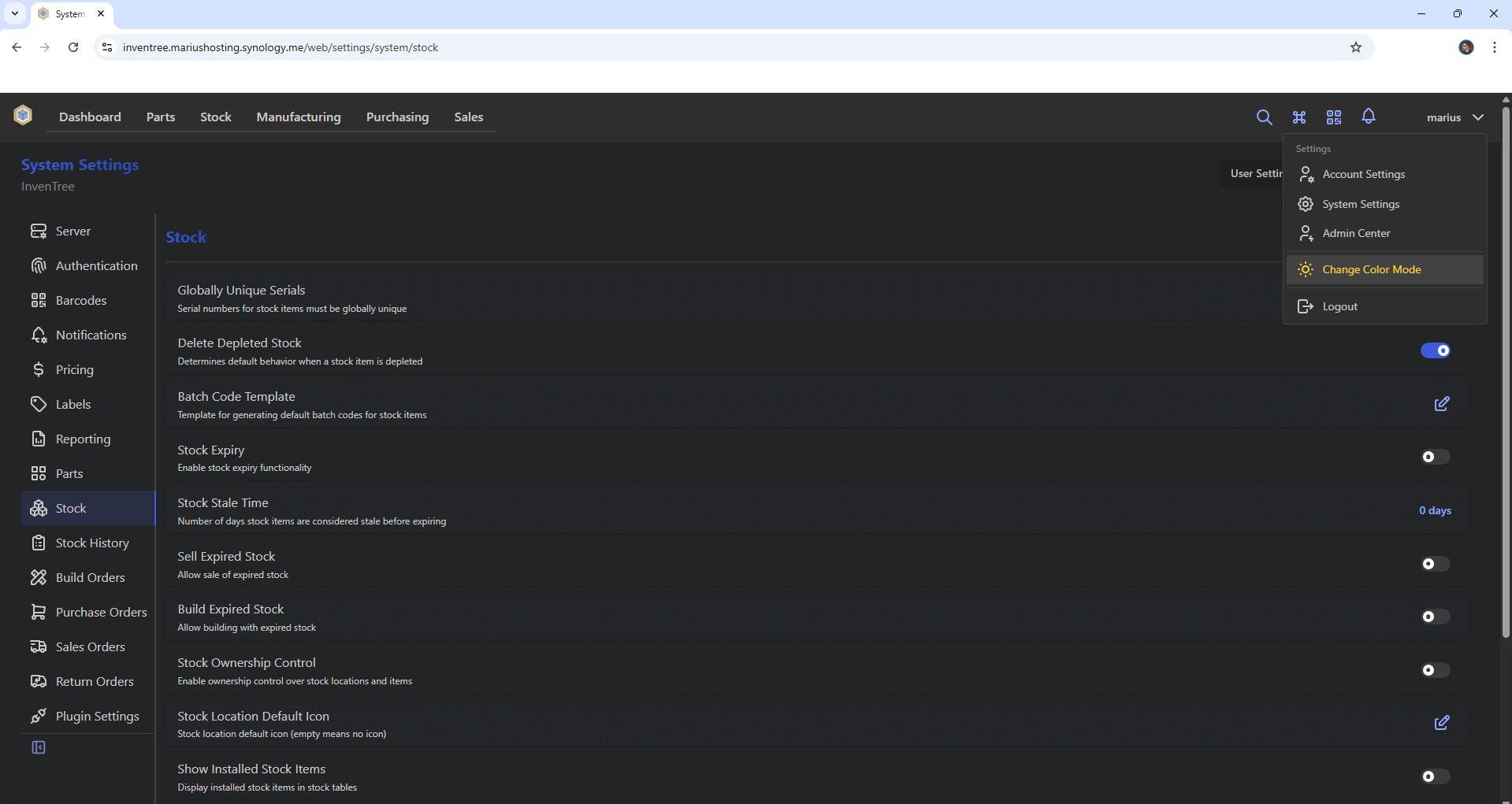
Enjoy InvenTree!
If you encounter issues by using this container, make sure to check out the Common Docker issues article.
Note: Can I run Docker on my Synology NAS? See the supported models.
Note: How to Back Up Docker Containers on your Synology NAS.
Note: Find out how to update the InvenTree container with the latest image.
Note: How to Free Disk Space on Your NAS if You Run Docker.
Note: How to Schedule Start & Stop For Docker Containers.
Note: How to Activate Email Notifications.
Note: How to Add Access Control Profile on Your NAS.
Note: How to Change Docker Containers Restart Policy.
Note: How to Use Docker Containers With VPN.
Note: Convert Docker Run Into Docker Compose.
Note: How to Clean Docker.
Note: How to Clean Docker Automatically.
Note: Best Practices When Using Docker and DDNS.
Note: Some Docker Containers Need WebSocket.
Note: Find out the Best NAS Models For Docker.
Note: Activate Gmail SMTP For Docker Containers.
